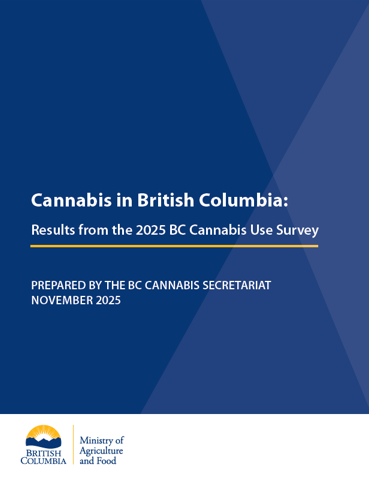Cannabis and your health
Cannabis can be used for medical or non-medical purposes. But it can also harm your health. Visit Healthlink to access B.C.'s source of health information and services.
On this page
- Cannabis basics
- Difference between medical and non-medical cannabis
- Impacts of cannabis on your health
- Health info for youth and parents
- Indigenous communities
Cannabis basics
Cannabis is a plant that contains cannabinoids. High temperatures make cannabinoids active. When inhaled or ingested, activated cannabinoids affect the brain and other parts of the body’s nervous system.
The most researched cannabinoid is Tetrahydrocannabinol, or THC. Activated THC causes the “high” experienced by cannabis users. THC can produce both pleasant and unpleasant effects. Unpleasant effects may be greater when the strength of THC is higher.
CBD
Cannabidiol (CBD) is another type of cannabinoid. CBD does not produce a high or intoxication and may have therapeutic effects.
Methods of use
Cannabis can be inhaled, ingested, or administered topically or sublingually (under the tongue). You can buy cannabis in different forms, including:
- Dried flower
- Ground flower rolled into cigarettes (joints or pre-rolls)
- Edibles (food and beverage products containing THC)
- Extracts or concentrates (often sold in vaporizer pens or cartridges)
- Resins (hash, shatter)
- Oils and tinctures
Edible cannabis has a delayed onset and extended duration of effects. It can take up to four hours to feel the full effects of edible cannabis.
Starting with a low dose or low THC product will help you find your comfort level with cannabis and avoid overconsumption. Overconsumption can cause anxiety, paranoia, rapid heartbeat, and other unpleasant effects.
Higher THC products, like concentrates, are more likely to cause dependency issues and other negative health impacts.
Mixing cannabis with other substances
Alcohol can intensify the effects of cannabis and create unpleasant reactions such as nausea or vomiting. Even experienced cannabis users can be negatively affected by the combination of alcohol with THC.
If you choose to use cannabis, reduce your chances of experiencing uncomfortable effects by avoiding alcohol and other drugs.
Difference between medical and non-medical cannabis
The Federal government, through Health Canada, is responsible for administering and regulating access to medical cannabis. Patients taking cannabis for medical reasons generally use cannabinoids to alleviate symptoms, while non-medical users may use cannabis for its euphoric effects. However, some people use cannabis for both medical and non-medical purposes.
Access to medical cannabis is controlled through the federal system under the federal Cannabis Act. Under the federal system, a health care provider authorizes medical cannabis use. The health care provider provides a medical document authorizing individuals to:
- Get cannabis from a federally licensed producer/seller
- Apply to Health Canada to grow their own cannabis
- Designate someone else to grow cannabis for them
Learn where to buy legal cannabis.
Impacts of cannabis on your health
Cannabis affects everyone differently. Learn more about
Mental health impacts
Long-term regular cannabis use can increase your chances of developing anxiety or depression. In severe cases, daily or near daily cannabis use can increase your chance of experiencing psychosis and developing schizophrenia.
Learn more about using cannabis safely and the dangers of cannabis use.
Cannabis use disorder
Cannabis can be habit forming. Learn more about the addictiveness of cannabis.
Pregnancy and breastfeeding
Cannabis use during pregnancy can harm your baby. Learn more about cannabis use during pregnancy and breastfeeding.
Health info for youth and parents
Youth are more likely to experience harms from cannabis use. Frequent heavy cannabis use by teens and people in their early 20s may lead to physical changes in the brain, as the brain experiences rapid development during the first 25 years of life.
Learn more:
- Cannabis and youth
- Is cannabis safe to use? Facts for youth aged 13-17 years (PDF, 164KB)
- Talking with teenagers about drugs and alcohol
Parents and guardians should monitor their own cannabis use closely to ensure it does not negatively affect their parenting ability.
Psychosis in youth
Research indicates youth who use cannabis are even more at risk of experiencing psychosis than adults who use cannabis.
Psychosis is a serious medical event that can lead to schizophrenia, a chronic and debilitating disorder.
Learn more about how to identify psychosis in yourself or others.
Indigenous communities
The First Nations Health Authority has resources and information specific to cannabis use and Indigenous communities, including more information on how to support Indigenous youth who may be struggling with their cannabis use.
Learn more about how the Province monitors cannabis use in B.C.

